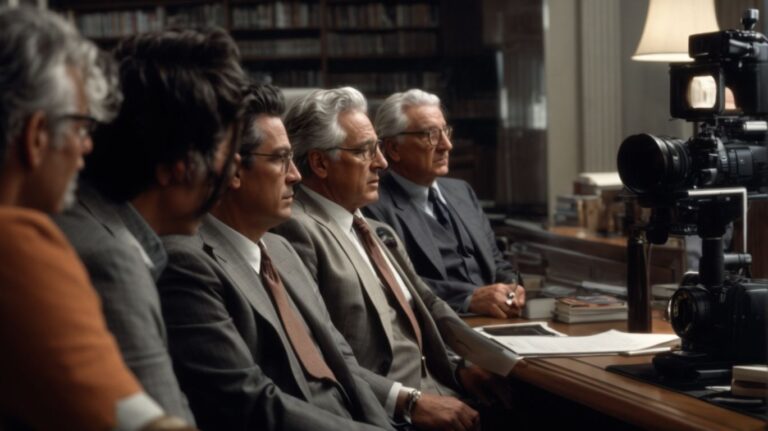Cognitive psychology, with its focus on understanding the intricate workings of the human mind, has been significantly shaped by the contributions of one influential pioneer. This individual’s background, education, and groundbreaking theories have left an enduring impact on the field. Through their innovative studies and concepts, they have revolutionized our understanding of cognition and paved the way for new research.
Join us as we explore the legacy of this remarkable figure and how their ideas continue to shape current cognitive psychology research.
Contents
- 1 Who is the Influential Pioneer in Cognitive Psychology?
- 2 What is their Contribution to Cognitive Psychology?
- 3 How Did They Influence the Field of Cognitive Psychology?
- 4 What is their Legacy in Cognitive Psychology?
- 5 Conclusion: The Enduring Impact of the Influential Pioneer
- 6 Frequently Asked Questions
- 6.1 Who is considered the most influential pioneer in cognitive psychology?
- 6.2 What contributions did Ulric Neisser make to the field of cognitive psychology?
- 6.3 How did the ideas of influential pioneers in cognitive psychology differ from traditional behaviorist theories?
- 6.4 What impact did the work of influential pioneers in cognitive psychology have on the field?
- 6.5 Are there any other influential pioneers in cognitive psychology besides Ulric Neisser?
- 6.6 How does the work of influential pioneers in cognitive psychology continue to impact research and practice today?
Who is the Influential Pioneer in Cognitive Psychology?
Cognitive psychology delves into the intricate workings of the mind, exploring mental processes such as attention, memory, and perception.
By studying how individuals acquire, process, store, and retrieve information, cognitive psychology provides valuable insights into human behavior and mental functions. Understanding the complexities of memory allows researchers to grasp how people recall past events and learn new information. Attention, a crucial aspect of cognitive processing, influences what information gets processed further and what gets ignored. Language processing reveals how individuals comprehend, produce, and communicate through speech and writing, shedding light on the intricate interplay between cognition and communication.
What is their Background and Education?
The influential pioneer in cognitive psychology emerged from a background deeply rooted in cognitive science and behaviorism, shaping their approach to understanding human cognition.
Having a strong educational foundation, their academic journey started with a focus on cognitive science, diving into the intricate workings of the mind and its processes. This early exposure instilled a curiosity that later evolved into a keen interest in behaviorism, studying the relationship between external stimuli and observable behavior. Their formative influences spanned across renowned scholars in these fields, sparking a passion for unraveling the complexities of the human mind. Through rigorous research and experimentation, they pioneered new methodologies that bridged the gap between theoretical concepts and practical applications.
What is their Contribution to Cognitive Psychology?
The contribution of the influential pioneer in cognitive psychology revolutionized the field by unraveling the complexities of cognitive processes and shedding light on attentional mechanisms.
Through meticulous research and groundbreaking experiments, he paved the way for a deeper understanding of how the human mind functions. His work not only elucidated the intricacies of memory formation and retrieval but also provided key insights into decision-making processes and problem-solving strategies.
Moreover, his innovative approaches to studying cognitive phenomena laid the foundation for the integration of cognitive science principles into various disciplines, shaping the development of artificial intelligence, educational psychology, and neurobiology.
What Theories and Concepts Did They Develop?
The influential pioneer in cognitive psychology introduced revolutionary theories and concepts, such as the intricate workings of working memory and the enduring nature of long-term memory.
His groundbreaking research shed light on the mechanisms behind how information is processed, stored, and retrieved in the human mind. By emphasizing the limited capacity of working memory and the importance of chunking information to enhance retention, his work laid the foundation for understanding cognitive processes.
His investigations into the role of schemas in organizing and structuring knowledge provided valuable insights into how individuals make sense of the world around them. His studies on cognitive load and the modality effect have also significantly influenced learning and memory research.
How Did They Influence the Field of Cognitive Psychology?
The influential pioneer reshaped the landscape of cognitive psychology through the cognitive revolution, profoundly impacting the understanding of human performance and cognitive phenomena.
This groundbreaking shift placed a significant emphasis on internal mental processes, paving the way for advanced studies in memory, attention, language, problem-solving, and decision-making. As a result, cognitive psychology became a prominent discipline that contributed extensively to the understanding of how individuals process information, make decisions, and interact with their environment. The pivotal concepts introduced by the pioneer led to an exponential growth in research on human cognition, establishing essential frameworks for studying behavior and mental processes.
What Studies Did They Conduct?
The influential pioneer in cognitive psychology conducted seminal studies that delved into memory research, perception studies, and the nuanced workings of cognitive processes.
One of the groundbreaking contributions of this visionary figure in the field included research that shed light on the complexities of memory formation and retrieval. Their work emphasized the role of schemas in organizing and interpreting information stored in memory, leading to a deeper understanding of how individuals process and recall information.
In the realm of perception studies, they explored the mechanisms underlying visual and auditory perception, uncovering how sensory information is processed and integrated to form coherent perceptions of the world. These studies reshaped the way researchers approached the study of perception and paved the way for further advancements in the field.
What Impact Did Their Work Have on the Field?
The influential pioneer’s work reverberated across cognitive psychology, influencing cognitive development, sensory memory research, and the understanding of cognitive functions.
His innovative research laid the foundation for modern theories of cognitive development by diving into the intricate processes that shape the human mind from infancy to adulthood. Through meticulous experimentation and analysis, key concepts such as schema formation and information processing were elucidated, revolutionizing the field.
His groundbreaking studies on sensory memory provided invaluable insights into the initial stages of perception and encoding, shedding light on how sensory information is temporarily stored and processed before being transferred to other memory systems.
This pioneer’s contributions not only refined our comprehension of cognitive functions but also opened new avenues for studying memory, perception, and decision-making in the realm of psychology.
What is their Legacy in Cognitive Psychology?
The legacy of the influential pioneer in cognitive psychology endures through their contributions to the rich tapestry of cognitive psychology history, encompassing dynamic psychology and enduring insights into human cognition.
Emerging during a critical time of evolution in psychological studies, cognitive psychology has been profoundly shaped by the innovativeness of this influential pioneer in cognitive psychology. Their work revolutionized the perception of human cognition, delving deep into the complexities of thought processes and mental phenomena. Through the lens of dynamic psychology, they unravelled the intricate workings of the mind and provided invaluable foundations for research in areas such as memory, perception, and problem-solving.
How Have Their Ideas and Theories Shaped Current Research?
The ideas and theories put forth by the influential pioneer in cognitive psychology continue to shape current research, particularly in the realms of language acquisition, memory distortion, and cognitive phenomena.
One of the key contributions of the pioneer’s work lies in the field of language acquisition, where researchers have found valuable insights into how individuals process and internalize language. By building on the foundation laid by the pioneer, contemporary studies delve deeper into the mechanisms that underlie language learning, spanning from early childhood to adulthood.
- Furthermore, the pioneer’s theories on memory distortion have sparked numerous investigations exploring the malleability of memory and the intricate interplay between perception and recollection.
- Advancements in understanding cognitive phenomena like decision-making, problem-solving, and attentional processes owe much to the pioneer’s groundwork, paving the way for innovative research methodologies and refined frameworks.
Conclusion: The Enduring Impact of the Influential Pioneer
The enduring impact of the influential pioneer in cognitive psychology resonates through the annals of human activity, shedding light on complex cognitive processes such as divided attention and cognitive phenomena.
Considered a trailblazer in the realm of cognitive psychology, this pioneering figure revolutionized the understanding of how individuals perceive, process, and respond to information.
Their groundbreaking research delved deep into the intricate workings of the human mind, unraveling the mysteries behind decision-making, problem-solving, and memory formation.
As a visionary thinker, their work not only advanced scientific inquiry but also had far-reaching implications in various fields, from education to technology, shaping modern approaches to learning and human interactions.
Frequently Asked Questions
Who is considered the most influential pioneer in cognitive psychology?
The most influential pioneer in cognitive psychology is widely considered to be Ulric Neisser, who is known for his groundbreaking work in the field and his famous book “Cognitive Psychology” published in 1967.
What contributions did Ulric Neisser make to the field of cognitive psychology?
Ulric Neisser is credited with popularizing the term “cognitive psychology” and for introducing an information-processing approach to understanding human cognition. He also conducted extensive research on perception, memory, and problem-solving, which paved the way for future studies in the field.
How did the ideas of influential pioneers in cognitive psychology differ from traditional behaviorist theories?
Influential pioneers in cognitive psychology, such as Ulric Neisser, focused on internal mental processes and the role of the mind in behavior, while behaviorist theories focused primarily on observable behavior and reinforcement.
What impact did the work of influential pioneers in cognitive psychology have on the field?
The work of influential pioneers in cognitive psychology laid the foundation for the modern understanding of human cognition and how it influences behavior. Their research has also influenced other fields, such as education, artificial intelligence, and neuroscience.
Are there any other influential pioneers in cognitive psychology besides Ulric Neisser?
Yes, there are several other influential pioneers in cognitive psychology, including Jean Piaget, Herbert Simon, George Miller, and Noam Chomsky. Each of these individuals made significant contributions to the field and helped shape the modern understanding of human cognition.
How does the work of influential pioneers in cognitive psychology continue to impact research and practice today?
The work of influential pioneers in cognitive psychology continues to be a fundamental part of research and practice in the field. Many modern theories and methods in cognitive psychology are based on their groundbreaking ideas, and their research continues to inspire new studies and advancements in the field.



